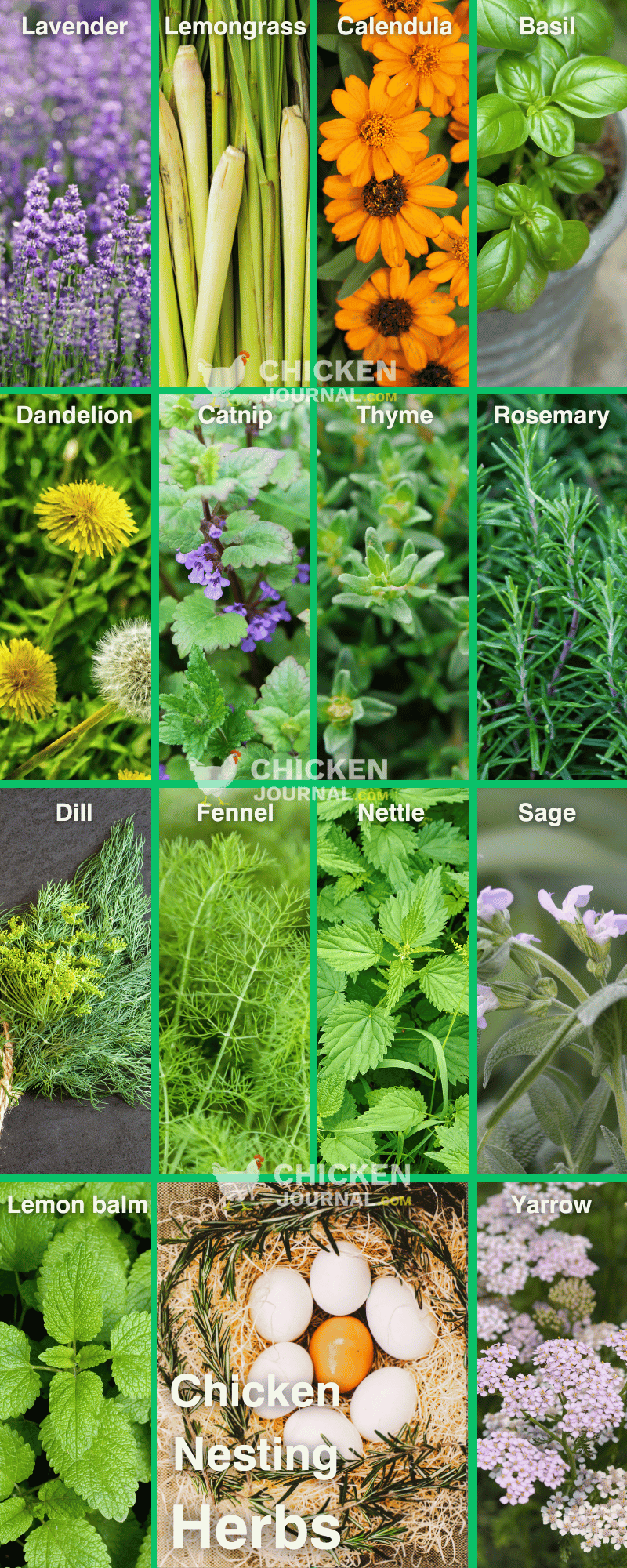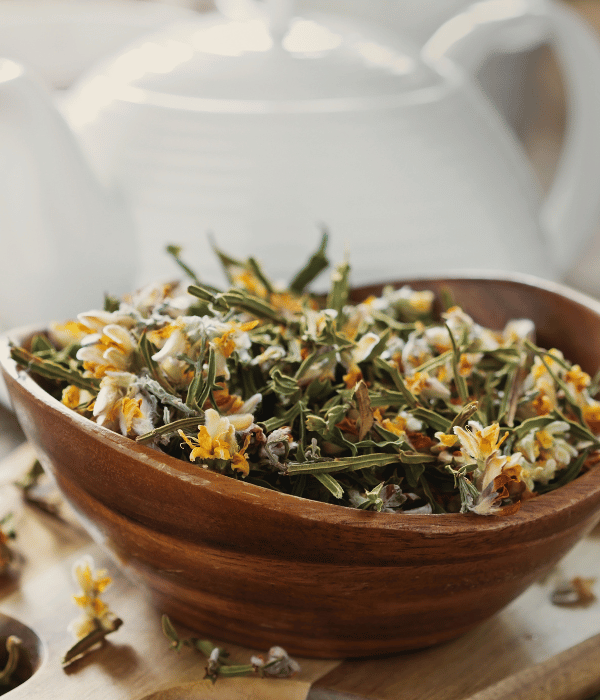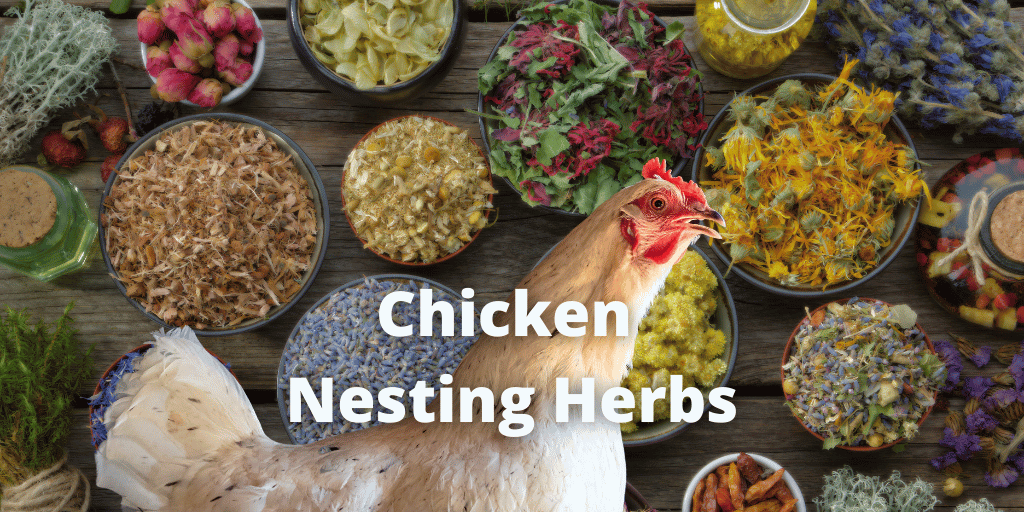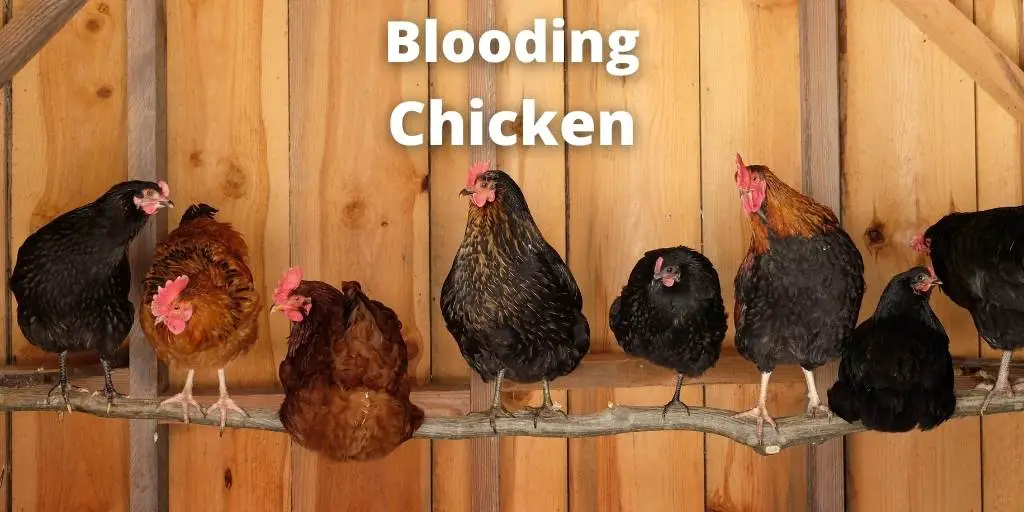Most poultry farmers add chicken nesting herbs to their chicken coop boxes and bedding.
But how are nesting herbs beneficial for your flocks?
What are the popular chicken-nesting herbs?
Which herbs are toxic to use in a chicken coop?
In this definitive guide, you will learn all about chicken nesting herbs, their benefits, a list of the best ones, a recipe for the herb mixture, and ways to add to the nesting box bedding.
What are Chicken Nesting Herbs for Chickens?
Chicken nesting herbs are plant-based materials used in coops, nesting boxes, and runs. Backyard chicken farmers use it to enhance their flock’s health.
These nesting herbs are best because chickens can eat, play, and live healthy on them. Overall, chicken nesting herbs are comfortable and healthy.
These plant-based nesting herbs make your chickens happier and healthier, ultimately improving their natural environment.
The Benefits of Using Herbs for Your Chickens
Chicken nesting herbs can improve a bird’s health, well-being, and egg production.
Here are a few common pros of adding nesting herbs in a chicken coop:
Increased immunity: Many nesting herbs work like natural antibiotics, antiviral, and antifungal medicines that can help keep chickens healthy. Backyard flocks need protection from disease-causing agents and worm infestation.
Relaxing environment: A few nesting herbs like lavender and chamomile help your chickens by reducing stress and enhancing chicken health.
Changes in the environment, like overcrowding and predators, may cause fear and stress in chickens. These herbs can reduce stress and calm hens.
Increase egg production: Mint is believed to increase egg laying and quality in chickens. Adding these herbs to your chickens’ surroundings could improve egg production in your hens.
Natural pest control: Herbs repel mites, lice, and fleas from chicken coops, run, and nesting boxes. These chicken nesting herbs help keep your flock clean and healthy, minimizing worm infestation.
Role of Herbs in Chicken Health and Happiness
These chicken nesting herbs help keep your chickens healthy. Nesting herbs creates a relaxing environment that promotes the chicken’s lifestyle.
There are many herbs available that can boost your chicken’s immunity, reduce inflammation, and repel external parasites and other insects.
Adding herbs to your backyard chicken coop can make them healthier, stress-free, and more illness-resistant.
Although it may cost extra to buy chicken coop herbs, they’re one of the best natural components for flock health.
- Excelsior nest pads help to provide cleaner, fresher,...
- Added colorful bouquet of aromatic, organic herbs, and...
- Comes with 10 nest pads per pack, 13” x 13”...
- Excelsior box pads help to provide stable footing for...
- Made in the U.S.A. Manufactured from Great Lakes aspen...
Last update on 2025-07-04 / Affiliate links / Images from Amazon Product Advertising API
List of All Herbs Suitable for Chickens and Their Uses

Amazon box=”B0BP7QMDRP”
Below is the list of a few popular used chicken nesting herbs:
- Lavender: Chickens like lavender because it calms and relaxes. Its smell calms your flock and keeps parasites and flies away.
- Lemongrass: Lemongrass repels mosquitoes, ticks, and flies with its citrus fragrance. Lemongrass in chicken nesting boxes or around the coop can deter these pests and improve your birds’ surroundings.
- Calendula: Nutritious snack, rich orange yolks; antimicrobial. Calendula flowers offer beauty to your landscape and assist your chickens.
- This can color your flock’s egg yolks a rich orange. Moreover, the antimicrobial properties can also keep poultry healthy and prevent infection.
- Basil: Basil also has several chicken health advantages. This substance’s antibacterial and anti-inflammatory effects improve flock health and reduce stress.
- Dandelion: Dandelion leaves and petals are a healthy snack for hens. Due to their antioxidant and anti-inflammatory characteristics, these herbs can boost your chickens’ immune systems and promote wellness.
- Catnip: Catnip often calms cats, but it can also quiet hens. Adding it in nesting boxes or around the coop can help your chickens relax.
- Thyme: Another plant that benefits chickens is thyme. Its antioxidant, antibacterial, and antifungal qualities protect the flock from disease. Thyme also repels mites and lice, keeping your chickens’ habitat clean.
- Rosemary: As an anti-oxidant and antibacterial nesting herb, rosemary can help keep your chickens healthy and prevent illnesses. Its powerful, pleasant aroma might help your birds feel more comfortable.
- Dill: Another herb that might lower flock stress and promote relaxation is dill. Dill also has antimicrobial characteristics that help keep poultry healthy and disease-free.
- Fennel: The fennel flower resists pests, is a healthy snack, and is anti-inflammatory. Fennel is a multipurpose herb with many chicken advantages. It repels mites and lice, keeping your birds’ habitat clean.
- Chickens can also graze on fennel, which provides critical elements for their wellbeing. The anti-inflammatory qualities of fennel help keep your flock healthy and comfortable.
- Nettle: Nettle is a nutritious snack that comprises vitamins and minerals which enhance your chicken’s health. The anti-inflammatory properties can also keep birds healthy and comfortable.
- Sage: Sage has amazing health benefits for chickens. Maintaining a healthy flock requires improving digestion and gut health. It also gets rid of pests, keeping your birds’ environment clean.
- Lemon balm: Lemon balm is another relaxing herb that helps your chickens live stress-free lives. Keeping it in nesting boxes or around the coop is best, as it can help your birds relax.
- Yarrow: The antibacterial properties of yarrow can keep hens healthy and prevent infection. It repels pests, keeping your birds’ surroundings clean and insect-free.
- Chamomile: Chamomile, a popular relaxing plant, can help your chickens relax. Chamomile in nesting boxes or around the coop can help your birds relax.
- Feverfews: The pest-repellent herb Feverfew can help keep your chicken’s pen clean. Spreading Feverfew around your birds’ nesting areas or coop will deter mites, lice, and flies.
- Mint: Mint is a multipurpose herb used in poultry farming. It repels mites and lice and keeps birds healthy with antibacterial characteristics. This also boosts egg production and quality, according to poultry caretakers.
- Chickweed: The chickweed provides vitamins and minerals to your chickens’ feed. Although chickweed is not used in nesting boxes, it can provide the flock with the nutrients they need.
- Oregano: Oregano is another chicken herb. This chemical has antibacterial, antibiotic, and anti-inflammatory characteristics that protect your flock from disease. Oregano also boosts chickens’ immunity, making them healthier.
- All natural aromatic herb blend for coop...
- This herbal mixture is a carefully formulated blend of...
- These aromatic herbal mixtures can also be used as...
- Poultry herbs are packaged in reusable airtight bags,...
- Packing specification: One bag, weighing about 8...
Last update on 2025-07-04 / Affiliate links / Images from Amazon Product Advertising API
Creating the Perfect Herb Mix Recipe for Your Chicken Nest
It’s important to pick various chicken nesting herbs that have various advantages.
Mixing them in a way that looks beautiful and useful to your chickens is the best way to use them.
Instructions for making a chicken nesting herb recipe:
Ingredients:
- Two teaspoons of dried rosemary
- Two teaspoons of dried thyme
- Two teaspoons of dried oregano
- 2 tbsp dried sage
- 2 tbsp dried parsley
- Tbsp dried marjoram
- 1 tbsp dried basil
- 1 tbsp dried tarragon
Optional:
- 1 tablespoon dried lavender flowers
- 1 tablespoon dried mint leaves
- 1 tablespoon dried dill
Instructions:
- Mix all dried herbs in a bowl.
- Add lavender, mint, or dill flower to the bowl.
- Mix the herbs well.
- Put the mixture in an airtight jar with a tight lid.
- Keep the chicken nesting herb mixture cold, dry, and out of direct sunlight.
Usage:
Sprinkle generously of the herb mixture into chicken coop bedding or nesting boxes.
Besides repelling pests, aromatic plants smell good and provide a relaxing environment for your chickens.
The History of Adding Herbs in Chicken’s Nesting Boxes
Natural herbs used in chicken nesting boxes come from the history of wild birds. Wild birds cover their nests with fresh herbs and flowers for many functions.
These herbs are fragrant, insect-repellent, and healthy for baby chicks. Domesticated chicken species are still connected with wild birds and benefit from nesting herbs.
Chicken farmers use herbs in nesting boxes to make their chicks comfortable and healthy.
Aromatic herbs and flowers are attractive, have antibacterial properties, control rodents, and create a happy environment for your chicken flock.
Chicken farmers used multiple herbs and flowers to identify the best ones. Oregano, thyme, parsley, lemon balm, chamomile, basil, yarrow, mint, and lavender are some of the best chicken nesting herbs.
Alternatively, depending on the availability of herbs in their locality or state, the poultry keeper can use either fresh or dried herbs.
How do you add herbs to chicken nesting boxes?
You can follow these easy methods for adding herbs to nesting boxes after preparation:
Wash the nesting boxes thoroughly.
Choose fresh or dried herbs according to season and your coop size. Some popular nesting herbs are lemon balm, chamomile, basil, mint, oregano, lavender, and thyme.
To prepare fresh herbs, air-dry them for a few days or dehydrate them to remove moisture. Get the right amount of dried herbs according to your flock size and box size.
Create a unique mixture by mixing herbs in a container. Customize the blend to suit your flock’s needs. Do not extreme press or crush the herbs.
Cover the nesting box with straw or wood shavings above the nesting herbs. Place the nesting herbs at the bottom of the bedding.
You can also spread an inconsiderable amount of chicken nesting herb mixture, gently covering the top area of the bedding.
That’s all! You have successfully added chicken nesting herbs.
Using Dried Herbs vs. Fresh Herbs for Chickens

You might be wondering whether fresh or dried herbs are healthier for hens. Which one should I use in my chicken coop?
Remember that fresh and dried herbs have different health benefits for your flock. Both types can be useful, but there are key differences.
Fresh herbs have a higher concentration of essential oils and active ingredients, which gives them more strength than dried herbs.
Compared to dried herbs, fresh nesting herbs may offer more health benefits.
Fresh herbs have a shorter shelf life than dried herbs and may need to be changed regularly to maintain efficiency.
In contrast, dried herbs prove to be a more advantageous choice for poultry enthusiasts as they possess a longer lifespan and maintain their beneficial characteristics while being more affordable.
Because of their long duration of storage and large availability, dried herbs are available year-round. Dried herbs are also used much more than fresh ones.
However, it is up to you to consider the availability, cost, and personal preferences when choosing fresh or dried nesting herbs for chickens.
Growing Your Herbs for Chickens in the Backyard
- 🍃Huge Value -18 Most Popular Culinary Herbs non-GMO...
- 🌱 Easy & Fun Growing Experience with our online...
- 🏡 Fresh Culinary Herbs All Year Round at Indoor or...
- 🎁 Outstanding Gift - for couples, vegetarians,...
- 🗽 Made in the USA by Small Family-Owned Business -...
Last update on 2025-07-04 / Affiliate links / Images from Amazon Product Advertising API
Herb gardening for hens is enjoyable and fulfilling, and they have many medicinal properties.
You can grow chicken nesting herbs in your home garden, patio, or balcony.
To grow chicken herbs, select the kinds your chickens will like that will deliver the health advantages you want.
Select a sunny, well-ventilated location for your herb gardening. Plant and water your herbs according to their instructions.
If your herbs are growing well, you can collect them for your chickens. Lastly, you might even sell your herbs if you grow a lot of them for nesting.
What Herbs Will Chickens Not Eat?
Chickens are great foragers, but some herbs can be deadly if they eat them in large amounts. Avoid these herbs in your garden for your chicken’s safety:
Foxglove: Large levels of cardiac glycosides in Foxglove might harm hens.
Yew: Taxine alkaloids in Yew can harm hens’ neurological and respiratory systems.
Nightshade: Tomatoes, potatoes, and eggplant contain solanine, which is dangerous for chickens.
Lily of the Valley: Chickens eating Lily of the Valley can vomit, have diarrhea, and have fluctuating heartbeats due to cardiac glycosides.
Rubarb: High oxalic acid levels in rhubarb leaves can harm chicken kidneys and impair calcium absorption.
Daffodils: Chickens can get heart disease, stomach trouble, and drooling from daffodil bulbs.
Even though some herbs are unsafe, hens are skilled at avoiding toxic plants. However, try to keep these plants out of their reach as much as possible.
What Herbs to Put in Chicken Nesting Boxes?
Consider using Lavender, Mint, Rosemary, Thyme, and Lemon Balm herbs for sprinkling dried herb leaves in hens’ nesting boxes. To maintain effectiveness, replace them regularly.
Adding herbs to chicken nesting boxes has multiple advantages. Herbs have natural pest-repellent properties, chicken health benefits, and a pleasing aroma.
Summary
Herbal therapy using herbs in a chicken coop can greatly improve your flock’s health and happiness.
You may make your chickens happier and healthier by choosing a variety of healthy herbs with varied health advantages.
Grow herbs to give your flock a fresh, natural source of these beneficial plants, and experiment with different herb combinations to find the best mix for your birds.
You can keep chickens happy and give them fresh, tasty eggs by supplying chicken nesting herbs.





